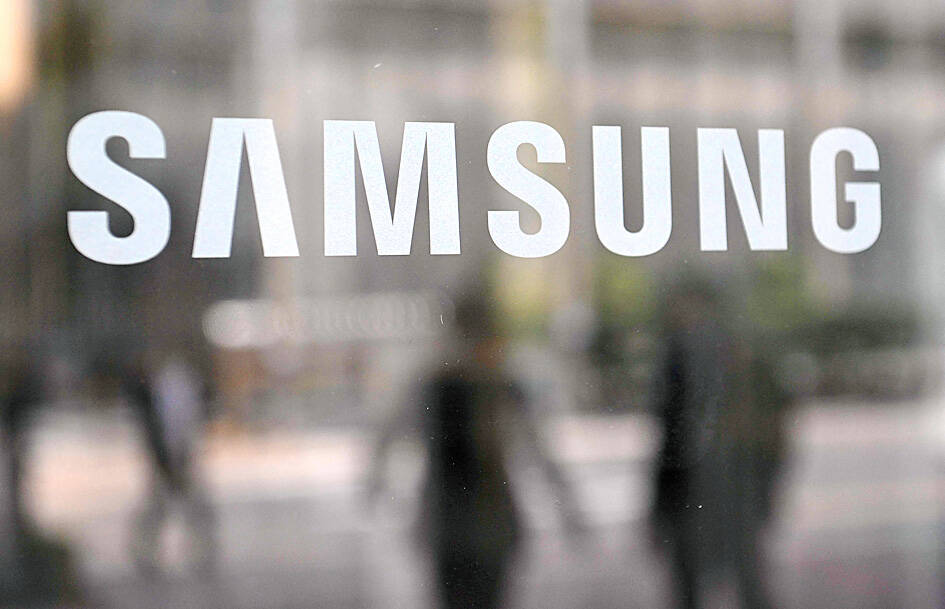Samsung Electronics Co and its largest labor union have tentatively agreed to a 5.1 percent wage increase and stock awards for staff this year, signaling efforts by the two sides to defuse tensions that triggered the company’s first-ever labor strike last year.
Under an initial agreement, Samsung would for the first time give 30 shares of the company to all employees — equivalent to about US$1,200 at yesterday’s closing price. Other perks include allowing each employee to purchase 2 million won (US$1,400) worth of Samsung’s electronics products at a discount, Samsung and the union said in a statement yesterday.
The National Samsung Electronics Union, which has about 37,000 members, is to vote on the preliminary agreement from Friday to Wednesday next week. The company is taking a step toward resolving labor tensions at a time when it is ceding market share to rivals in several key arenas. Samsung’s shares slid 1.6 percent in Seoul yesterday,

Photo: AFP
South Korea’s largest company lost more than one-third of its market value last year after failing to close the gap on SK Hynix Inc in the contest to sell advanced memory for Nvidia Corp’s artificial intelligence (AI) accelerators. It is also facing heightened competition in smartphones and other consumer electronics from Chinese rivals.
Among measures agreed upon initially, Samsung would begin a policy to rehire retirees with three or more children — reflecting the higher education costs such employees face and addressing domestic challenges.
South Korea has one of the world’s lowest birthrates, at just 0.72 children per woman in 2023.
The government is pouring more than 380 trillion won into baby-boosting incentives, including subsidies for prenatal care and monthly cash payments for families with children up to five years old.
Other companies are joining the endeavors. Booyoung Group, a housing construction company, began giving 100 million won to each employee who has given birth since last year. Gaming company Krafton Inc is planning to offer similar cash payments to staff.

UNCERTAINTY: Innolux activated a stringent supply chain management mechanism, as it did during the COVID-19 pandemic, to ensure optimal inventory levels for customers Flat-panel display makers AUO Corp (友達) and Innolux Corp (群創) yesterday said that about 12 to 20 percent of their display business is at risk of potential US tariffs and that they would relocate production or shipment destinations to mitigate the levies’ effects. US tariffs would have a direct impact of US$200 million on AUO’s revenue, company chairman Paul Peng (彭雙浪) told reporters on the sidelines of the Touch Taiwan trade show in Taipei yesterday. That would make up about 12 percent of the company’s overall revenue. To cope with the tariff uncertainty, AUO plans to allocate its production to manufacturing facilities in

Taiwan will prioritize the development of silicon photonics by taking advantage of its strength in the semiconductor industry to build another shield to protect the local economy, National Development Council (NDC) Minister Paul Liu (劉鏡清) said yesterday. Speaking at a meeting of the legislature’s Economics Committee, Liu said Taiwan already has the artificial intelligence (AI) industry as a shield, after the semiconductor industry, to safeguard the country, and is looking at new unique fields to build more economic shields. While Taiwan will further strengthen its existing shields, over the longer term, the country is determined to focus on such potential segments as

TAKING STOCK: A Taiwanese cookware firm in Vietnam urged customers to assess inventory or place orders early so shipments can reach the US while tariffs are paused Taiwanese businesses in Vietnam are exploring alternatives after the White House imposed a 46 percent import duty on Vietnamese goods, following US President Donald Trump’s announcement of “reciprocal” tariffs on the US’ trading partners. Lo Shih-liang (羅世良), chairman of Brico Industry Co (裕茂工業), a Taiwanese company that manufactures cast iron cookware and stove components in Vietnam, said that more than 40 percent of his business was tied to the US market, describing the constant US policy shifts as an emotional roller coaster. “I work during the day and stay up all night watching the news. I’ve been following US news until 3am

COLLABORATION: Given Taiwan’s key position in global supply chains, the US firm is discussing strategies with local partners and clients to deal with global uncertainties Advanced Micro Devices Inc (AMD) yesterday said it is meeting with local ecosystem partners, including Taiwan Semiconductor Manufacturing Co (TSMC, 台積電), to discuss strategies, including long-term manufacturing, to navigate uncertainties such as US tariffs, as Taiwan occupies an important position in global supply chains. AMD chief executive officer Lisa Su (蘇姿丰) told reporters that Taiwan is an important part of the chip designer’s ecosystem and she is discussing with partners and customers in Taiwan to forge strong collaborations on different areas during this critical period. AMD has just become the first artificial-intelligence (AI) server chip customer of TSMC to utilize its advanced